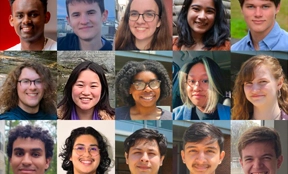
TREND 2024 end-of-summer conference poster gallery and booklet.

Project type: Computation and Experiments
Photonic integrated circuits allow us to confine light on silicon-based chips and process information using photons both at the classical and quantum level. One significant advantage of using light as opposed to electrons is its versatility. For instance, we can control the photon's polarization, modes, wavelength, intensity, etc., translating into plenty of opportunities when developing architectures for applications such as photonic computing. Some of these versatile properties are now being harnessed to create so-called “synthetic dimensions” as well.
Nonlinear effects from controlled light-matter interaction increase the possibilities even further; they allow applications ranging from mimicking the neuron's response in unconventional computing architectures to generating light sources with wavelengths or spectra otherwise unavailable. Recent research has thus strongly focused on exploring and finely controlling novel light-matter interactions and exploring nonlinear avenues for photonics in on-chip technology.
TREND participants in this project would answer questions like:
The research questions are accessible to students from various disciplines and backgrounds including Physics, Materials Science, and Electrical Engineering, and introduce students to numerical simulations and modeling, on-chip nonlinear photonic devices, and lasers.
Profs. Dutt and Ríos Ocampo have mentored 14 and 7 undergraduate researchers, respectively. From these, 2 have been through the TREND program.
Want help getting in touch with these mentors? Reach out to Daniel.